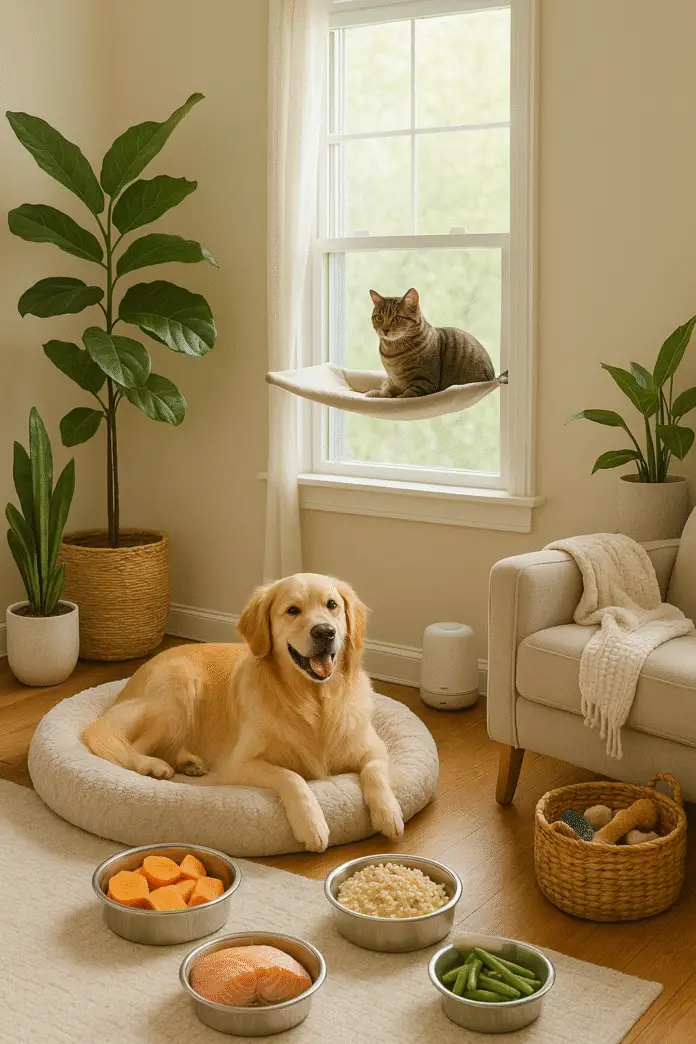Why Emotional Health Matters for Pets
Just like humans, pets experience a wide range of emotions. Anxiety, loneliness, boredom, and stress can all impact a pet’s behavior and overall well-being. Whether you have a dog that whines when left alone or a cat that hides under the bed during storms, supporting your pet’s emotional health is key to fostering a happy, balanced life.
Creating an emotionally nurturing environment at home doesn’t require a major overhaul—it’s about thoughtful tweaks and habits that provide comfort, stimulation, and security. Let’s explore practical home environment hacks to help your pets feel emotionally safe and loved.
1. Establish a Safe and Comfortable Space
Every pet needs a personal retreat where they can relax and feel protected. This could be a cozy nook in your bedroom, a crate lined with soft bedding, or a quiet corner in the living room.

Tips to Implement:
- Use calming pheromone diffusers (like Feliway for cats or Adaptil for dogs).
- Set up the area away from noise sources like TVs, busy windows, or front doors.
- Include their favorite blankets, toys, and maybe an item that smells like you.
Having a dedicated comfort zone can greatly reduce anxiety during loud events (like fireworks) or when guests visit your home.
2. Provide Mental Stimulation
Mental stimulation is just as important as physical exercise—especially for intelligent breeds and indoor pets.
Fun Ideas:

- Puzzle feeders or treat-dispensing toys that make them work for their snacks.
- Hide-and-seek games using food or toys around the house.
- Regular training sessions, even for simple commands.
Rotating toys and introducing new challenges keeps your pet’s mind sharp and prevents destructive boredom behaviors.
3. Maintain a Consistent Routine
Pets thrive on predictability. When your pet knows what to expect, it gives them a sense of control and stability.
Routine Essentials:
- Feeding at the same times daily.
- Scheduled potty breaks and exercise.
- Consistent sleep and wake times.
If your work schedule changes or life gets hectic, try to maintain at least a morning and evening ritual. This consistency reassures your pet that their needs will be met.
4. Pet-Proof and Enrich Your Home
Safety plays a big role in emotional health. A home that’s free from dangers and full of opportunities for play will make your pet feel more secure and engaged.
How to Pet-Proof:
- Secure loose electrical cords and cover outlets.
- Store household cleaners, plants, and medications out of reach.
- Install baby gates if you need to block access to certain rooms.
At the same time, enrich their living space with scratching posts, climbing shelves, window perches, or tunnels. Let your pet explore and express natural behaviors in safe ways.
5. Use Calming Sounds and Scents
Certain sounds and smells can have a calming effect on pets, helping reduce stress and separation anxiety.

Calming Techniques:
- Play soft classical music or pet-specific playlists (available on Spotify and YouTube).
- Use white noise machines to drown out disruptive outdoor noise.
- Try calming sprays or diffusers with lavender or chamomile scents (ensure pet-safe formulations).
Studies show that consistent auditory and olfactory cues can make pets feel safer, especially during times when you’re not home.
6. Bring Nature Indoors
Exposure to natural elements, even inside your home, can support your pet’s emotional regulation.
Nature-Inspired Hacks:
- Open blinds or curtains during the day for natural light.
- Add pet-safe indoor plants like spider plants, areca palms, or bamboo.
- Create a window perch for your cat or a sunning spot for your dog.
Sunlight improves mood and energy levels, while green plants can create a soothing atmosphere for both you and your pet.
7. Encourage Social Interaction
Whether your pet is a social butterfly or a more reserved companion, interaction with humans and other animals can be emotionally enriching.

Ways to Foster Connection:
- Schedule regular playdates with friendly neighborhood pets.
- Visit pet-friendly parks, cafés, or trails.
- Provide a variety of human interaction: grooming, petting, training, or even just talking to them.
Even pets that are shy benefit from positive exposure to new faces and experiences in a safe setting.
8. Prioritize Comfortable Sleep Spaces
Rest is essential for healing, processing emotions, and maintaining energy. A proper sleeping area directly contributes to a pet’s emotional resilience.
Sleep-Friendly Setup:
- Choose a supportive bed tailored to your pet’s breed and age.
- Keep their sleeping spot away from cold drafts, heaters, or busy doorways.
- Wash bedding regularly to maintain hygiene and comfort.
A good night’s sleep reduces irritability and supports immune health—both of which affect emotional balance.
9. Keep the Environment Clean
Cleanliness isn’t just a human preference—it affects your pet’s stress levels too. Messy or smelly environments can heighten anxiety, especially for cats or small pets sensitive to changes.
Clean Home Tips:
- Regularly vacuum hair, dander, and debris.
- Clean litter boxes or pet pads daily.
- Use unscented, pet-safe cleaning products to avoid overwhelming smells.
A tidy, odor-free environment signals safety and control to your pet’s senses.
10. Prepare for Environmental Changes
Moving, remodeling, or even bringing in a new pet can trigger stress in animals. Advance planning can help your pet adjust more smoothly.
Transition Support:
- Gradually introduce new spaces before a full move.
- Bring along familiar toys, bedding, and scents to maintain comfort.
- Provide extra attention and comfort during transitions.
If you’re adding another animal to the home, introduce them slowly through scent swapping, visual barriers, and short supervised meetings.
Conclusion: A Happy Pet Starts at Home
Supporting your pet’s emotional health is an ongoing effort—but it starts with the home you create. A secure, clean, enriched environment forms the foundation for a confident, content pet.
By implementing these environment hacks, you’re not just improving your pet’s mental well-being—you’re also strengthening your bond and building a healthier, more joyful life together.




Greetings from Los angeles! I’m bored to death at work so I decided to check out your website on my iphone during lunch break. I love the information you present here and can’t wait to take a look when I get home. I’m amazed at how quick your blog loaded on my mobile .. I’m not even using WIFI, just 3G .. Anyways, excellent blog!